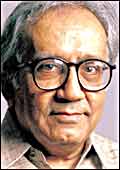|
Who
says the average Indian will never part with her gold? On December
4 this year when gold price shot up to Rs 6,045, an eight-year high,
people in Maharashtra and Gujarat queued up at jewellery stores
to sell some of their gold. Obviously, the idea was to book a tidy
profit while the prices were high. It's safe to assume that these
are people who will not buy clothes or even a car with the money
they have realised. Instead, they are most likely to wait for gold
prices to fall and then refill their impoverished gold boxes. So,
will gold prices fall in the days to come?
To answer that question, one needs to understand
why they've been rising continuously for the last four years. For
starters, gold is a commodity pretty much like oil and rubber, therefore,
its price is determined by demand and supply. But that does not
explain why prices have moved up so rapidly since 1999. According
to A.V. Rajwade, CEO, Rajwade & Co., a treasury and forex management
consulting firm, there's a "cocktail of factors". These
include worries about the US dollar-in the last 12 months, it has
lost 17 per cent versus the Euro, 8 per cent against the British
pound, and 10 per cent compared to the Japanese yen-threat of terrorism,
lumbering growth in developed economies, poor returns on savings,
among others.
India has not been untouched by those concerns, as it turns out.
Gold prices usually start going up (apart from changes in the demand-supply
equation) when other avenues of investment, especially equities,
start under-performing. But in India, the stockmarket has been on
a steep climb beginning this year, and yet gold prices have risen
alongside. What this indicates, then, is the underlying mood of
uncertainty across the world. While historically gold has never
been a darling of investors, the rush this time stems from a desire
to protect the principal. Even that, Rajwade contends, is a myth.
"That's more psychological than real, since research shows
that gold prices have not really kept pace with inflation over the
long term," says Rajwade.
Have gold prices peaked? The consensus seems
to be that it hasn't. Armesh Arora, Vice President, Bombay Bullion
Association, feels that prices have also gone up because some of
the biggest gold producers such as Newmont Mining Corporation, Barrick
Gold Corporation, and Anglo Gold Ltd. are no longer hedging their
bets by getting into long-term contracts, but are into spot selling.
Yet, not many think it will cross the Rs 7,000-mark (for 10 gm)
because central banks, which hold the maximum amount of gold in
most countries, may just step in by increasing their supply of gold.
The massive jump in gold prices has meant two
things. First, it has led to a sharp drop in imports of gold-down
16 per cent over last year. Two, it has prompted gold recycling,
with people selling their old-fashioned jewellery to take advantage
of the high prices. "It is recycled gold that is making up
for the lack of imports," says Arora.
What should be your investing strategy? Wait
to see if prices inch up to the Rs 6,500-mark. If they do, offload
some of your holding and wait. Once the US stockmarkets pick up
next year, gold may start its inevitable descent. Then you can buy
back whatever gold you had sold-at lower prices.
-Ashish Gupta
Year
Of Bounty
Direct tax collections are set to soar.
 |
| FM Jaswant Singh: Making tax history |
The economy
has to be doing well, folks. For the first time since Independence,
the government is set to exceed its own direct tax collection targets.
By the end of November this year, the government had pulled in Rs
42,716 crore by way of income and corporate tax, marking an 18 per
cent jump, which is more than the budget estimate of 16 per cent
growth. At this rate, the finance ministry will exceed its target
of Rs 95,714 crore. The total tax collection, too, is cruising.
At Rs 1,29,947 crore, the takings represent 49 per cent of the budget
estimate of Rs 2,51,527 crore. Small wonder then, the ministry is
all smiles.
What caused the surge? As far as corporate
tax is concerned, "good corporate earnings and general buoyancy
in most industrial sectors of the economy", says a senior ministry
official. On the income tax front, "it is again a combination
of increased income and better tax compliance", reckons Saumitra
Chaudhury, Chief Economist, ICRA. However, there's some cause for
concern amidst all the good tidings. Indirect taxes, which include
customs and excise duties, grew a modest 9 per cent, netting Rs
87,330 crore during April-November, 2003. The reason is two-fold:
One, the government has been lowering import duties, besides rationalising
excise duties. Two, the expected jump in international trade did
not materialise.
There's some consolation, though. The share
of direct taxes in the overall tax kitty is growing by the year-up
from 19.1 per cent in 1990-91 to nearly 35 per cent today. The recent
surge, therefore, should help in bringing down the fiscal deficit
pegged at Rs 1,53,637 crore, or 5.6 per cent of the GDP.
-Ashish Gupta
LNG
Springs A Leak
British Gas shelves its LNG plans for India.
 |
| Nigel Shaw, CEO, British Gas India: Retired
hurt |
The
churn has started even before the first LNG-carrying ship could
reach the Indian shores. In early December, 2003, British Gas (BG)
became the first casualty when it pulled out of the $550-million
(Rs 2,530-crore) Pipavav LNG project in Gujarat. "The project
must be viable in order for BG India to take forward the development,''
explains Nicole McMohan, Director, BG India. Why did BG pull out
of the project when until recently it was so confident about LNG's
future as alternative fuel in the country? Or more importantly,
are these hugely expensive and risk prone projects-LNG Petronet
and Shell have already coughed up close to $500 million (Rs 2,300
crore) each for building regassification terminals as well as setting
up multi-cargo, all-weather ports-feasible when upstream players
like Reliance, Niko, Cairns, and ONGC have already announced huge
reserves finds?
For BG India, in a way, it made greater sense
to pull out of the Pipavav project and consider the nearly-complete
Dabhol project for possible acquisition, rather than invest in a
greenfield project. After all, Petronet's LNG terminal in Dahej,
Shell's LNG import and regassification terminal at Hazira and Reliance's
gas finds in the Krishna-Godavari basin would come ahead of BG India's
operations. What's more, big clients such as fertiliser and power
companies can tap multiple options for long-term agreements on LNG.
"All this had put a serious question mark on the viability
of BG's investments," explains Satyam Agarwal, analyst at Motilal
Oswal Securities.
What the industry needs is some clarity on
LNG prices. Matching ONGC and Oil India's price of $2.50 per million
British thermal unit (BTU) is virtually impossible for the new players.
That means BG may not be the only LNG player to pull out.
-Ashish Gupta
BJP
And Reforms
Will BJP's wins at assembly elections kickstart
reforms?
 "Disinvestment
is caught in a loop. But the fact that the government has asked
the Supreme Court to re-evaluate its stance on disinvestment is
in itself a good sign." "Disinvestment
is caught in a loop. But the fact that the government has asked
the Supreme Court to re-evaluate its stance on disinvestment is
in itself a good sign."
Ravi Mehrotra/President/Franklin Templeton
 "The
wins have imbued the ruling party with self-confidence. The message
is clear. It shows that development rather than Hindutva can clinch
more votes. " "The
wins have imbued the ruling party with self-confidence. The message
is clear. It shows that development rather than Hindutva can clinch
more votes. "
Kirit Parekh/Director & VC/IGIDR
 "What
this proves is that elections will be fought and won on issues of
overall progress and quality of life. The government should accelerate
reforms." "What
this proves is that elections will be fought and won on issues of
overall progress and quality of life. The government should accelerate
reforms."
Sanjeev Goenka/Vice Chairman/RPG Group
 "Industry
is strongly confident that reforms will continue, despite 2004 being
an election year. I think the election wins also drive home that
fact." "Industry
is strongly confident that reforms will continue, despite 2004 being
an election year. I think the election wins also drive home that
fact."
Tarun Das/Director General/CII
|
